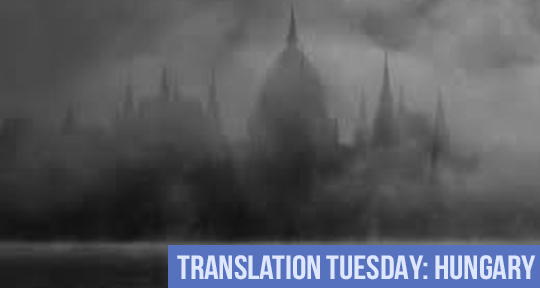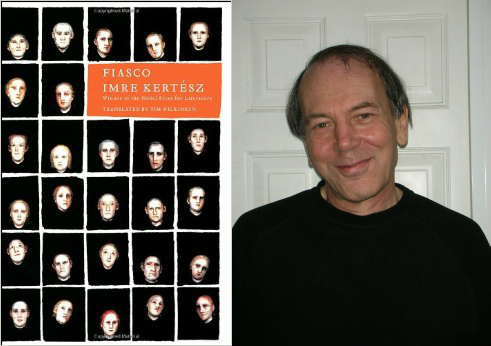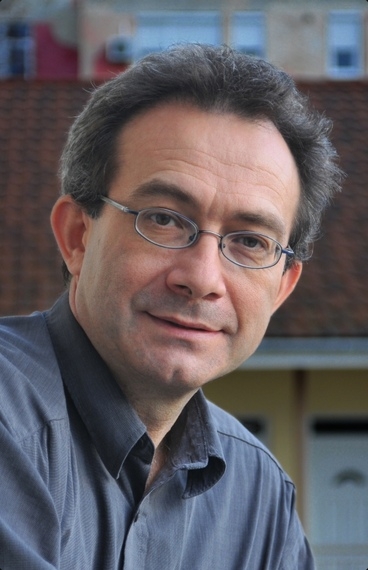I first read “The Vanished City Hall” one extremely foggy morning, on Mr. Bajnai’s historical blog, as I was just waking up. We had had a series of foggy days, so when I came to the part that mentioned the fog—“With regard to the disappearance of the Szolnok city hall, it is worth noting that that weekend was especially cold and so foggy that you couldn’t even see Kossuth Square from the nearby buildings”—I began to wonder whether this had actually happened: whether the city hall had been taken away and I simply hadn’t noticed. As I read further, I found more and more hints that this was a satire (for one thing, it was assigned to the blog’s “Szolnok Stories” category), but on my way to work, I bicycled by the city hall just to make sure. By then the fog had lifted, and the domes glistened in the sun. When translating this story, I tried to convey both the rhythm of the language and the bizarre plausibility of the plot. The former required rearrangement of the sentences at times; the latter required colloquial flexibility. I strove to convey not only the events, but the many voices of the many characters, from the anonymous complainant to the “ridiculed local architect-historian.” I enjoyed the time spent with the words and hope that the English translation will reach many readers.
—Diana Senechal, translator
By Monday morning Szolnok’s city hall had disappeared. To wit: on the plot at the corner of Kossuth Square and Táncsics Street, on the flattened, muddy soil, nothing was left but some construction debris and truck tire marks. And the worn metal fence, which had been erected around the building as early as Friday. What had become of the building was anyone’s guess.
“On Friday afternoon we noticed some people putting up a fence around the city hall,” said a resident of the house across Kossuth Square who requested anonymity. “It didn’t even occur to us that something fishy was up. We thought they were re-renovating the building. My wife even said that this was Brussels all over again. She meant that the union must have funded some newfangled idiocy.”
From neighboring Táncsics Street, on Friday afternoon, someone started placing phone calls to various authorities. He called the police, public places, even the city hall, because, according to later hearsay, he was furious that people would operate enormous machines on the weekend in downtown Szolnok. After the fence-builders left, the excavators, conveyed in the same trailer to the site, got down to work. In retrospect, you could deduce that the perpetrators had been playing it safe. Their demolition of the city hall, built in 1884, began from the courtyard. This way, until Sunday evening, locals could sense that something was happening behind this neoclassical building’s street facades only because huge dump trucks turned up in great density, plowing the cobblestone roads not only around Táncsics street, but around the theatre and Verseghy Park.
The police told the caller on Friday afternoon that this case was outside of their purview until blood flowed or a crime was committed. True, they had sent a patrol once or twice to the site because of the noise. It could later be gleaned from the reports that each time they came, they warned the noisemakers to knock it off, and each time they received a promise in return. So after the fourth or fifth call, the Miskolc center no longer forwarded the notices to Szolnok. They later explained that after so many calls they began to suspect a prank.
With regard to the disappearance of the Szolnok city hall, it is worth noting that that weekend was especially cold and so foggy that you couldn’t even see Kossuth Square from the nearby buildings. Not only that, but it just so happens that this, the city’s main square, is basically deserted except during Advent and a few summer weekends, so hardly anyone heads there on non-workdays. Still more important—and a ridiculed local architect-historian brought this to our attention years ago—is that Szolnok has long been accustomed to weekend demolitions, old buildings disappearing, all sorts of investment projects without any advance announcement or on-site notice. Later it turned out that the perpetrators knew about none of this yet benefited from it. “Probably all of this started with a real estate sale contract that had been switched with another by mistake,” stated the police officer originally in charge of the investigation, who was convinced he had been fired on the go because the facts—forget about how much time he had put into assembling them—seemed so incredible that those with a stake in covering up the case could easily chalk them up to incompetence. “The contract of sale for the apartment building at Kossuth Square 7-8 was carelessly replaced at some time or other with the decades-older contract for number 9, and thus only the transfer of Kossuth Square 9 was valid. This faulty contract then ended up, through an inheritance lawsuit, in the hands of a resourceful local lawyer, who was up to his neck in debt, from which he essentially released himself through the sale of the city hall.” In the former policeman’s seemingly unbelievable report, it appears that, with the sale contract that he had acquired for pennies, the lawyer paid off Serbian creditors, who in turn paid Bulgarian human smugglers with the title to a larger building in the center of an unknown Hungarian city. Later the property, which had never actually been seen by anyone in this succession of deals, and which in the meantime had been described as a “nineteenth-century eclectic office building,” went on paper in a thick dossier to an investor, and from him to an Austrian financial institution as collateral for defaulted loans. Then, during the bank’s year-end balance beautification process, thanks to a recommendation prepared by a Hungarian junior clerk working in Austria and supplemented with photos, topographic identifier, and building history, a Hungarian big businessman became the owner of that basemented, storied, domed building. READ MORE…







